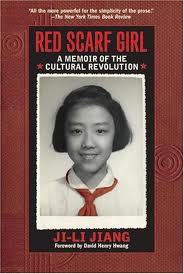Red Scarf Girl by Ji-Li Jiang
Reviewed by Keri

Ratings Explanation
Language: A few common swear words. Taunting and degrading talk towards those who were accused of being non-revolutionists (teachers, parents, wealthy, elderly etc). Signs were hung around the city claiming unlawful actions and wrong doing on the part of many innocent people.
Violence: The Revolution caused many to look down on the wealthy regardless of age or health. Many teachers, parents and elderly were pushed around and beaten to get a confession of wrong doings. Those who were suspected of having different political views and opinions were tortured and beaten until they confessed, whether they were guilty or not. Some committed suicide rather than face a life of disgrace.
Sexual Content: Teacher accused of having relations with a student. Mention of a women who had several sexual relations outside of marriage. Ji-Li has an admirer but wants nothing to do with him. When Ji-Li’s home is searched they find her sanitary belt. She is humiliated that nothing is kept private.
Adult Themes: The Revolutionaries taught that political status comes before family. Many young people were caught up in the allure of their Revolutionary leaders and disowned their families. The Revolution was meant to bring new ideas and change to improve China. All old traditions and anything alluding to them were to be destroyed. The homes of many families were searched for photos, books, clothing, antiques etc. that reflected old China. These things were confiscated and destroyed, leaving many families in poverty. Teachers were looked down on as corrupting the minds of the youth with old ways. They were publicly disgraced and replaced with new Revolutionary-minded teachers. Reverse discrimination from the poor to the wealthy was common. The wealthy were publicly humiliated and made to work regardless of age or health to help them repent of their years of wrong doing. Those who were suspected of different political views were subjected to verbal torture from family members and physical punishment from captors.
Synopsis
When Mao Zedong launches China’s Cultural Revolution, young Ji-Li’s world turns upside down. She was top of her school class and highly recognized for her hard scholastic work. Ji-Li comes from a well-to-do Chinese family with a history of wealthy landlord ancestors. The Revolution taught that all old culture must be abandoned and the wealthy blamed for China’s suffering. Ji-Li’s father, the son of a wealthy landlord, is detained leaving the rest of her family living in constant fear. Over the next few years, Ji-Li must decide whether to disown her ‘black’ family and join the Revolution or give up all she has worked so hard for to help her family.
I was deeply touched by Ji-Li’s story. I have a better understanding of how an entire nation can be swallowed up in an idea that leads to their destruction. The Revolution through a child’s viewpoint was powerful and eye opening. I closed the book with an appreciation for our incredible freedom and an admiration for all of the heroes around the world that choose to follow their heart. The author, Ji-Li, currently oversees projects that promote eastern and western relations. She also shares her story in person with many students around the nation.
©2010 The Literate Mother









